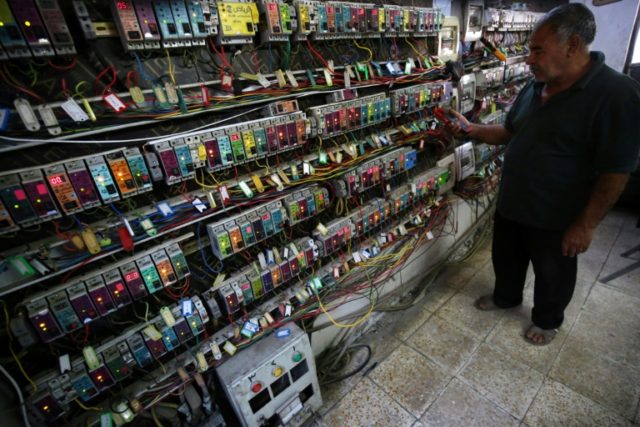Baghdad (AFP) – As the stultifying summer heat sends Iraqis in search of cool spots, restaurateur Ali Hussein provides sanctuary — even though it means hooking up to an expensive generator.
“The clients must be comfortable when they eat,” said Hussein, who stakes his reputation on ensuring customers are constantly blasted by air conditioning.
Outside, temperatures at this time of year can reach 50 degrees Celsius (120 Fahrenheit), sending demand for electricity soaring.
But Iraq’s dilapidated power grid is unable to cope, leaving business owners — and the few citizens who can afford it — beholden to private supplies.
Hussein forks out 225,000 dinars ($190) a month to the owner of a generator for a 15 amp electricity supply to his Baghdad restaurant.
It’s the “gold” option, guaranteed to run uninterrupted.
But the cost is more than some Iraqis earn.
And for most citizens, there is little escape from a heat that barely abates even at night.
We have only “four or five hours of electricity” a day from the national grid, grocer Mouthanna Mehdi told AFP.
Anger over the power shortages fed into deadly unrest in July.
At least 14 people were killed in street protests that began in the oil-rich southern city of Basra on July 8 and spread to other areas including Baghdad.
– Winners and losers –
Like Hussein, Mehdi earns enough to pay for electricity from a generator.
But he can only afford a five amp supply.
It’s “not enough to power all the lights and the air conditioning at the same time”, he said.
“Sometimes the generators break down or stop when they run out of fuel, which can damage our electrical appliances,” the 40-year-old added.
Generators are a regular fixture on street corners in Baghdad and other major cities, often hastily installed by small businessmen to exploit peak summer demand.
Tangles of wires protrude from the devices, disfiguring the city and sometimes causing electrical fires.
But as with every crisis, there are winners as well as losers.
If the power situation “was resolved, we would lose our work”, said Hussein Kazem, who sells fuel to the owners of generators.
– ‘Lies and theft’ –
Experts say supply of electricity falls at least 40 percent short of demand during the summer.
And a substantial slice of the estimated $40 billion allocated to the power sector over the past 15 years has vanished.
Money from public tenders has allegedly lined the pockets of corrupt politicians and businessmen who fronted fake contracts.
In a bid to quell protests, Prime Minister Haider al-Abadi on Sunday fired electricity minister Qasim al-Fahdawi.
Fahdawi had been the architect of a privatisation programme that was meant to herald electricity 24 hours a day.
Iraqis say the project worked well for a few months in the zones where it was tested.
But as soon as the summer heat arrived, power cuts multiplied once more.
The authorities say they have upped electricity generation by nearly 50 percent to 17,000 megawatts since 2014.
Ordinary Iraqis are sceptical about this figure.
“This is all lies and theft,” said Mazen, who fixes generators and did not want to give his full name.
“The leaders divert the money and hide it abroad. And when they say the situation is improving, you can be sure they are lying,” he said.

COMMENTS
Please let us know if you're having issues with commenting.